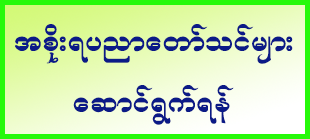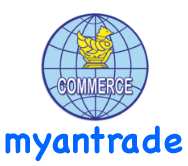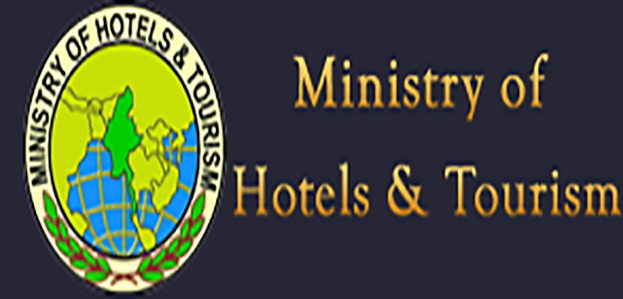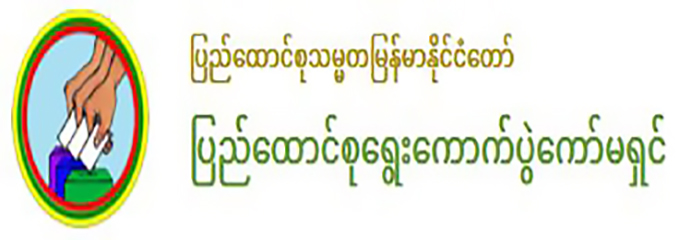Investment Opportunities
New Investment Opportunities in Myanmar
Introduction
- Location:
Southeastern Asia, bordering the Andaman Sea and the Bay of Bengal, between Bangladesh and Thailand.
Myanmar is situated in a geopolitically important area between the two giants of the orient which are also the emerging economies serving as the engine of growth for the world economy. Because of their size, population and rapid economic growth, our two giant neighbors are also huge markets where consumption is high. This brings opportunities that Myanmar can trade with these potential markets by two ways: overseas trade and overland trade. Moreover, Myanmar lies in a strategic position by connecting South Asia to South East Asia and the East Asia. It can also be said that the gateway to the Andaman sea for landlocked Laos and Yunnan Province of China. Being a GMS member country, Myanmar has more opportunities to promote economic and social development by strengthening economic linkages through East-West Economic Corridor and North-South Economic Corridor.
Myanmar is rich in natural resources and there is an immense potential for direct investment from abroad. Foreign direct investment in Myanmar is increased over the time and as of 31st March 2012, it reached USD 40699.048 million. Of which, China ranks the first in foreign direct investment. Myanmar has encouraged the participation of foreign investors in the exploitation of Myanmar’s comparative advantage of abundant natural resources, human resources, comparative labor cost and cultural heritage under the market-oriented system, thereby enhancing long-term mutually beneficial economic corporation.
Since the incumbent government has taken the State’s responsibilities, a series of reform measures is taken place. These reform measures include political reform, administration reform, economic reform and social reform. With regard to economic reform, the amendment of commodities and service bill was already approved by Pyidaungsu Hluttaw. Besides, the the Foreign Investment Law (1988) was also revised and got approval from Parliament. At the same time, the four drafted bills –Patent Law, Industrial Design Law, Trademarks and Service Marks Laws and Copyright Law – are under amendments in coordination with Union Attorney-General Office and World Intellectual Property Organization (WIPO). These laws will be promulgated and active shortly in near future. Meanwhile, all investors shall enjoy the tax exemptions and reliefs and guarantees according to the Section 21 and 22 of the Foreign Investment Law (1988).
The right to use land relating to FIL
The Myanmar Investment Commission (MIC) permit to lease the land of the person entitled to lease land to investor the following lands with prior approval of the Union Government:
(a) Government-owned lands;
(b) Lands owned by the government department, organization;
(c) Private lands owned by citizen
The Commission may allow to lease the land for which the investor is desirous to lease for carrying out agricultural, livestock breeding businesses on commercial scale by using the vacant, fallow and virgin lands and works for economic development relating to it. The term for the land use starts with initial 30 years from a person entitled to lease the land or a person the right to use land.
The Commission may, if the investor is desirous to continue to carry out after the expiry of the term permitted to the investor and if the agreement is obtained from the person entitled to lease land or the person having the right to use land, permit to extend two consecutive terms of 15 years based on investment volume and category of business.
If it is a perennial and garden crop cultivation business, it has the right to carry out for 30 years commencing from the year first permitted. If it is a seasonal crop cultivation business, it has the right to carry out as long as the stipulated terms and conditions are not violated. If it is a fish, prawn aquaculture business or a livestock breeding business, it has the right to use for 30 years commencing from the year first permitted.
The investor has the right to carry out the contract farming system at the farms where the citizens obtained the right to carry out only in joint-venture system with citizen investor for carrying out accordingly to crop season to grow and produce farm crops on mutual interest.
The Commission may allow the land lease rental approved by the relevant Union Ministry in respect of the rate of land lease rental of the land owned by the Government department, Government organization and may submit to the Union Government if necessary and carry out.
The rate of the rental of the land leased by the investor form a person who is entitled to lease land or a person having right to lease land and conclusion of agreement yearly in accord with the current price according to the lease period shall be discussed, determined and submitted the rate of rental of the land lease to the Commission.
In leasing Government department-owned land or Government organization-owned land, the relevant Government department or Government organization shall demand land lease premium from the investor.
Towards a sound financial system: Regime Change
Myanmar has opened a new chapter in its financial sector by launching a new exchange rate regime of ‘managed floating exchange rate’ on the 1st April, 2012, thereby abandoning its 35 years old regime where the official rate of national currency ‘Kyat’ was pegged to the International Monetary Fund’s Special Drawing Right (SDR) at the rate of 8.50847 kyats per unit of SDR since 1977. Under the new system, the external value of kyat will be determined not by the monetary authority but by the market forces of supply and demand.
Recently, the monetary authority has scrapped the so called ‘export earning rate’, which served as a major restriction on imports. Under this new policy, importers are free to use their moneys in their Foreign Exchange accounts in importing things from abroad. Import permits will be granted without securitizing whether the FE balances are export proceeds or not. The move would reduce market segmentation and ease appreciatio01n pressure on the economy.
Moreover, restriction on withdrawal of foreign currency from one’s account has been relaxed: up to the amount of USD 10,000 can be withdrawn from one’s FE account with one of the state-owned foreign trade banks, and for the amount over USD 10,000, settlement can be made by domestic account transfers.
On top of the above, eleven private banks with authorized dealer licenses are setting up their SWIFT communication system and establishing their own correspondent banking network. They will soon be able to do full-fledged foreign banking and will provide trade financing and remittance services to their customers. Sooner or later, illegal Hundi remittance system will disappear in the country with the introduction of legal remittances through banks.
Rights to transfer foreign currency
The investor may transfer the following currencies abroad through the bank prescribed by the Commission in the relevant foreign currency:
(a) Foreign currency entitled to by the person who has brought in foreign capital;
(b) Foreign currency permitted for withdrawal by the Commission to the person who has brought in foreign capital;
(c) Net profit after deducting relevant funds relating to various taxes from the annual profits received by the person who has brought in foreign capital;
(d) Legitimate balance after causing to pay the taxes due and after deducting living expenses for himself and his family in the manner prescribed, out of the salary and lawful income obtained by the foreign service personnel by performing service in the State:
(e) Money entitled to the investor after liquidating the invested business;
(f) Damages obtained lawfully by the investor.
The Commission may permit to transfer the same amount as applied or lesser than such amount after scrutiny for the application by the investor to transfer foreign currency outside the country.
The investor has the right to make account transfer in foreign currency from the foreign account opened in the bank by a citizen or a citizen-owned business in the State after submitting the sufficient documents of the local kyats obtained from carrying out business that he has invested.
The investor shall, if desirous to extend and invest the business without transferring to outside the country, the profits obtained from carrying out the economic business that he has invested to the Commission and submit obtain permission.
Liberalization on taxation
As taxation is important to the nation, tax laws and notifications have been enacted and announced from time to time.
The income tax levied in foreign currency on incomes of foreign exchange of the enterprises run with CMP (Cutting, Making and Packaging) system from 10 percent to 2 percent. The income tax levied in foreign currency on incomes f salaries in foreign exchange of nationals and foreigners living in the nation from 10 percent to 2 percent. Commercial tax exemption is given to all the export commodities except petroleum, natural gas, teak log and conversion, hardwood log and conversion, jade and in order to encourage export.
Agriculture sector
The agricultural sector is a dominant force in Myanmar’s national economic development. Being an agro-based country, Myanmar is trying its utmost for the development of agricultural sector, especially boosting paddy output for domestic consumption and export. The strategic measures have been introduced to improve agricultural productivity through area expansion, yield increase, crop diversification, application of advanced post harvest technology related to better storage, milling and packaging systems.
The local and foreign entrepreneurs are invited to invest in the form of Joint Venture or 100 percent investment in the following areas:
(a) Establishment of Agro-based industries
(b) Assembling and manufacturing of light agricultural machinery and small farm implements
(c) Manufacturing of agricultural inputs and related support products
The potential areas for agro-based industries are plantation, sugar mills, cotton industry, jute industry, rubber industry and assembling and manufacturing of light agricultural machineries and small farm implements.
Livestock and fishery sector
Myanmar has vast pasture land with suitable climate for animal husbandry and poultry. Myanmar with a coastal line of 2,832 km is also rich in marine resources. It has been estimated that the Maximum Sustainable Yield (MSY) of Myanmar is 1.05 million metric tons annually on a sustainable basis, based on the surveys and researches undertaken in marine fisheries. Fisheries in Myanmar can be classified into freshwater fisheries and marine fisheries.
Production, processing and marketing of all fishery/ fishery related activities are carried out by the private sector. All state owned fishing vessels, carrier vessels, ice plants, processing plants, cold stores, fishmeal plants, dehydration plants etc, are sold or leased to the private sector and the government and the Ministry of Livestock and Fisheries encourage and support the expansion, and role of the private sector.
Manufacturing and industry sector
With the abundant natural resources, high labor quality available at low cost, existing manufacturing facilities and favorable geographic location, Myanmar has high potentials for industrial development. The government accelerates privatization of State-owned Enterprises as well as encouraging downstream manufacturing to reduce the dominance of primary commodities in exports with the aim to have 34.2 percent ratio of industrial sector to the GDP in 2015-2016 and to achieve 14.1 percent development annually.
To meet strong infrastructure requirements, a total of 30 industrial zones were established throughout the country since 1995. The priority industries in which investment is strongly encouraged are export-oriented industry like agro-based industry, wood-based industry and processed and semi-processed seafood. Besides, non-resource-based industry and labor intensive industry are also being encouraged under FIL and Myanmar Citizens Investment Law. Import substitution manufacturing industries such as consumer durable products and construction materials are also potential areas to invest for domestic consumption and export.
At present, the agro-based industries in terms of number as well as value are predominantly agricultural products processing industries such as rice million, edible oil milling, beans and pulses processing, food and beverage, etc. Meanwhile, it needs to establish industrialized nation for national prosperity. It is required to extensively set up factories and workshops to be able to manufacture value-added products replacing primary products. To establish factories and workshops, it needs to invite both local and foreign investments.
Forestry sector
The forest policy of Myanmar has been formulated according to the forestry principles adopted by the UN Conference on Environment and Development. Myanmar is rich in forest resources, as the forest covers about 50 percent of the total land area. According to its climatic zones from temperate to arid and tropical, several variant forest types exist, including the deciduous forests and dry forests in the central parts , delta mangroves, lowland tropical rainforests in Taninthayi Region, teak forests, semi-deciduous forests further north, and sub-alpine in northern Kachin State. There are also various kinds of plant species, including tree species, orchid, bamboo and cane.
There is a great investment opportunity for the production of forestry products. Besides, foreign companies are also allowed to develop private forest plantations in the degraded forests of the reserved forests and protected public forests, in accordance with the rules and regulations issued by the Ministry of Environmental Conservation and Forestry and permission of Myanmar Investment Commission.
Mining sector
Myanmar is blessed with abundance mineral resource deposits including tungsten, tin, zinc, silver, copper, lead, coal, goal, industrial minerals, antimony, limestone, marble, Gemstones and oil and gas. The policy objective of the Ministry of Mines is to immediately boost up the present production fulfilling the growing domestic needs and at the same time promoting exports. Types of possible investments can be through production sharing or profit sharing arrangement. Both the arrangements are consistent with international practice and the Ministry of Mines is flexible enough to negotiate on a case by case basis. These opportunities consist of participating in mineral exploration, improvement and revamping of existing mines and plants, expansion of production capacities using more profitable, efficient and appropriate technology or new projects with already known or partly known deposits.
Power sector
Much emphasis and priority is placed on the development of the electric power sector because of its vital importance to the nation’s social and economic development. Myanmar has an abundance of hydropower. This enables Myanmar to consider development of hydro power projects not only for domestic power supply but also for export to the neighboring countries.
For the Generation Sub Sector, FDI can be done by getting the permission from Foreign Investment Commission under the Law and Procedure of Foreign Investment, in the form of Joint Venture and Build-Operate-Transfer (BOT) system for suitable power generation projects. Local investors are also allowed to participate in the scheme of Independent Power Producer (IPP) for hydropower projects.
Oil and gas sector
Myanmar’s petroleum sector is administered by the Ministry of Energy. Myanmar Oil and Gas Enterprise under the Ministry of Energy is responsible for conducting exploration and production of crude oil and natural gas, in both onshore and offshore areas. The Ministry of Energy has invited multinational companies to participate in the exploration and production of crude oil and natural gas in Myanmar’s onshore and offshore areas, in cooperation with Myanmar Oil and Gas Enterprise on a production-sharing basic. Other investment opportunities under this sector are as follows:
(a) Exploration and production in petroliferous onshore and offshore Myanmar
(b) Rehabilitating to marginal fields and enhancing to decline fields and suspended fields
(c) New plants commissioning; Refinery, LPG, LNG, Fertilizer Plants
(d) Floating Storage Unit (FSU), Floating Storage and Offtake Facilities
(e) CNG refueling stations and necessaries parts and kids
(f) Research and Development
(g) Trading, Marketing and Retailing of Petroleum Products
(h) Indispensable equipments to revamp and renovate in Drilling rigs, Refineries and Plants
Education sector
Myanmar has emphasized and much encouraged for the development of education sector which is playing vital role for the development of the country. With the view to that Myanmar Investment Commission has invited the foreign investors to invest in the education sector. The Law for the opening of private schools is promulgated for locals very recently. Opening the school for not only the basic education, but also vocational education is big opportunities in the Myanmar’s education sector. There is a huge local market for education sector which has evidence that many Myanmar students both in Primary, Secondary and Tertiary education levels are seeking for the overseas education who are mainly go to Singapore, Thailand, Australia, Malaysia, United Kingdom and United States.
Hotel and tourism sector
Myanmar is a cultural destination with its rich cultural heritage and is also blessed with natural environments like snow capped mountains, beautiful lakes, long rivers lush tropical forests, unspoiled beaches and archipelagoes. Currently, there are 709 authorized tour operators which include one foreign owned ravel agency, 16 joint venture travel agencies and 692 travel agencies which are operated by local entrepreneurs. There is a growing need for international class hotels in major tourist sites. There are also many newly opened areas where there are no hotels of international standard. Many opportunities for the investment in developing golf courses, beach resorts, tourist village, amusement parks, recreational centers are also available. Therefore, Myanmar offers considerable economic opportunities and potentials for FDI.
Transport sector
Better transport is a basic need for the development of every region. Ensuring smooth transport contributes much to economic development as well as to simultaneous improvement of socio-economic life of local people. At present, the people have easy access to various regions thanks to already-built roads and bridges by Tatmadaw government. Thus, commodities can be transported smoothly and speedily from one place to another. Infrastructures on transport sector are being upgraded in the region for having better access in the future.
Up to now, there are 142,395 km of road networks. The length of various categories of road are Union Highways (18,740 km), township network road (19,045 km), major city road. Moreover, the nation has 6620 under-180 feet long bridges and 463 above-180 feet long bridges. Ministry of Construction is encouraging to Major roads linked to neighboring countries are:
(a) Asian Highways
(b) ASEAN Highways
(c) Greater Mekong Sub-region, GMS-Highways
(d) BIMST-EC Highways
(e) India-Myanmar-Thai Tripartite Highways
(f) India-Myanmar, Thai-Myanmar, Bangladesh-Myanmar Bilateral Highways
(g) GMS, East-West Economic Corridor Highways
(h) GMS, North-South Economic Corridor Highways









